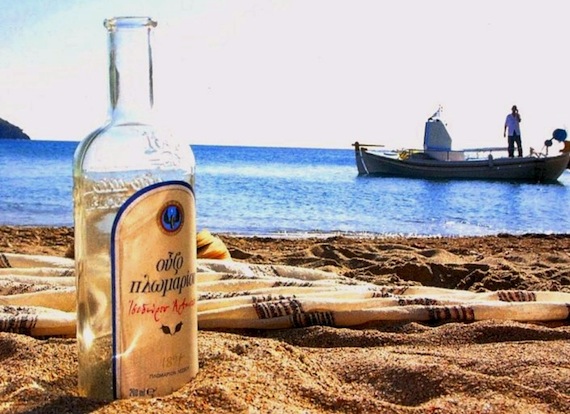We know it’s called Drinking In America but today is is Greek Independence Day and if it involves ouzo we’re ready to celebrate. Today commemorates the start of the War on Greek Independence on March 25, 1821. If you have Greek ancestry, or you just want to pretend you do, the best way (that we know of) is to mark the occasion with some authentic Greek drinks.
The Greeks seem to have mastered the art of drinking. They regularly drink in moderation and the liquor always flows freely during festive occasions. Wine and beer are both very popular alcoholic beverages in the country, but there are a few types of liquor you’re really only likely to encounter in Greece:
Ouzo
Ouzo is generally considered to be Greek’s most popular alcoholic drink; the Greek government even has the exclusive rights to use the product name “ouzo.” It’s a colorless, anise-flavored, unsweetened liqueur and the island of Lesvos is known as the hub of ouzo production. It is usually served neat with no ice, but some Greeks will add iced water if they want to dilute the strength of the 40 percent alcohol content. If you’ve never tasted it before, add a splash. Ouzo is the type of drink that won’t hit you right away, so sip slowly.
Tsipouro/Raki
Tsipouro is old-school Greece because tradition says tsipouro was first produced by Greek Orthodox monks in the 14th Century. In some areas of Greece, tsipouro is called raki. It’s made from the pomace of grapes, which is the residue of the wine press. Tsipouro is very versatile and can be served at many different times of the day in different forms. Some drink it as a hot beverage in the morning to replace coffee (our kind of Greeks), while some may drink it as a refreshment later in the day in place of wine. If not being served hot, it will usually be served in shot glasses with ice.
Retsina
Retsina dates back to ancient times and it is a traditional Greek wine aromatized with pine resin. Way back in the day, they would seal wine vessels with Aleppo Pine resin because it helped to keep the air out and the wine from spoiling. The pine resin kept the oxygen out, but it also infused the wine with its aroma and the flavor became crazy popular. It’s kind of an acquired taste and many feel it tastes best with Greek food.
How will you be channeling your Greek roots today? Raise your glass and say “Opa.”


